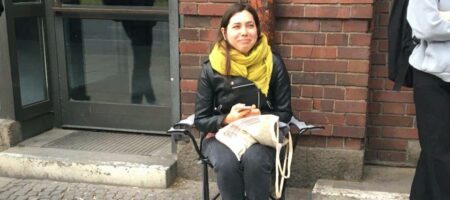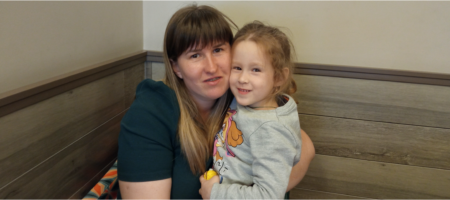Lyuba is a woman of 37 years from Militopol and is an active and widely educated business woman. She had been running several businesses in Ukraine, including information technology academy, Step IT, which is one of the largest international institutions that specialises in computer education; it operates across 43 branches in 15 countries.
Today, Lyuba is sitting in a cafe in a small tourist town within Ustroń with her mother and father, who will remain with her – to support her – as she speaks. Her mother, Oksana, is a professional crisis psychologist and also has her own business in Ukraine. Lyuba describes her father as a hard worker and a great support to the family.
Militopol, where Lyuba and her family are from, is a city and municipality in Zaporizhzhia Oblast of southeastern Ukraine, currently under Russian military occupation. The city is located at the crossing of two major European highways, and there is also an electrified railway line of international importance that goes through the city. It was called ‘the gateway to the Crimea’; prior to the 2014 Russian occupation of Crimea. Control of the city would allow Russian troops to advance towards Berdiansk and then to Mariupol, which would establish a land connection linking Crimea and the Donetsk People’s Republic.
Before the war, Lyuba would have described her life in the same way that her mother would have described hers: colourful and active. It was a vibrant life, full of connection, collaboration, business meetings, bright and exciting projects and self development.
The war came and ruined everything. It washed all the colour away.
Lyuba’s parents left the country before she did. First, they helped close friends and colleagues to get out. After that, Oksana and her husband left by car, travelling to Poland to stay with friends.
At this time, Lyuba wasn’t planning to leave the city. Although it was already occupied and being bombed, she was actively helping the Ukranian soldiers, identifying and reporting Russian military transport in and around the city. She hoped that she could stay to support the resistance. The situation was incredibly frightening, but she wasn’t alone. She was surrounded by close friends and partners and within their shared experience they felt like one, big supportive family.
Lyuba’s decision to move out and away from these connections was very hard and taken under great pressure and fear. Active and well-known people in Militopol were being hunted and killed. To Lyuba, it felt that there were only two choices: stay and probably die, or take a chance on leaving to save your life.
At 5am one night, under darkness, Lyuba left her home with a backpack in one hand and her small dog in the other. The city curfew restrictions were in place until 7am, meaning that anyone outside could be shot on sight, but leaving at this time still felt safer. She was heading to the ‘point’ – one of the places where, in closed chats on social media, people with logistics to escape arranged to meet and flee the city.
The most fearful thing for Lyuba herself was crossing the enemy’s posts on the way to the point. Behind her, voices warned, “Are you sure you want to go? You could be killed at any moment.” Lyuba answered, “We are going.”
Every step could have been the last, but I had taken the decision to move on.
Many people were waiting at the point. Lyuba sat in one of the cars that waited to transport them, pressed amongst so many unknown people, but at the same time feeling like they were now all in the same boat; one united and supportive family.
Lyuba will never forget seeing the bullet-ridden cars of families; the deceased parents and children inside. She says it will never leave her memory and will always evoke tears from her.
Cars transported Lyuba to Zaporizhya, then on to Lviv, which is about 70 kilometres from the border with Poland – and then on to Krakiv, Poland. Friends met Lyuba and her family in Poland and she felt a huge support, and also as if she could finally inhale after holding her breath for so long. The support is a comfort, but is also painful.
People say, ‘take this, it’s for you; you are a refugee now’ – and it makes me cry.
Lyuba’s whole family is safe now. They met in Ustroń, where they are staying for a while at a friend’s summer house. Lyuba’s mother, Oksana, is actively volunteering and supporting other refugees with her psychology and crisis expertise. Lyuba’s father is supporting and caring for both mother and daughter. Lyuba is collecting her energy for a new start and feeling optimistic about a new future. Her spirit is impressive.
I am a cosmopolitan. If I could do it in Ukraine, I could do the same in any country.
But still, she says that she desperately wishes that she could go home.
Posted on March 26th, 2022
Voices Ukraine



